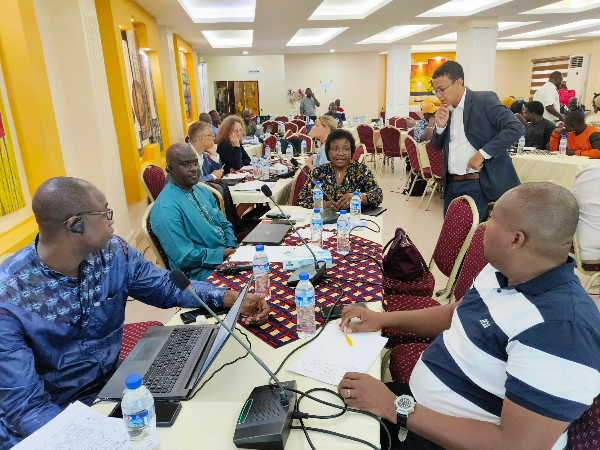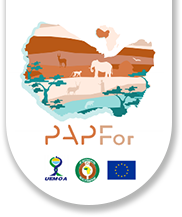Home / News / EU-PAPFor and USAID-WABiLED collaborate to establish a framework for (...)
EU-PAPFor and USAID-WABiLED collaborate to establish a framework for sustainable forest-cocoa coexistence in West Africa
In West Africa, cocoa production is expanding at the expense of tropical rainforests as governments face challenges managing protected areas. In light of this, the European Union funded Support Programme for the Preservation of Forest Ecosystems in West Africa (PAPFor) and the United States Agency for International Development (USAID)-funded West Africa Biodiversity and Low Emissions Development (WABiLED) Program collaborate to find solutions for developing the cocoa sector while also preserving the Guinean forest, which spans from Guinea to Western Cameroon. The two programmes are being implemented in transboundary forest landscapes across the region.

On 16-17 May 2023, a two-day workshop was organised by PAPFor and WABiLED in Monrovia, Liberia, under the theme: ‘The state of play of initiatives and tools promoting the coexistence of forest conservation and the environmentally friendly development of cocoa in West Africa.’ The participants, including national governments, regional institutions, conservation partners, the private sector, and agriculture experts from across West Africa and Europe, deliberated and developed a roadmap for sustainable co-existence between cocoa production and conservation. Also in attendance were officials from the West African Economic and Monetary Union (UEMOA), Mano River Union (MRU), and the Economic Community of West African States (ECOWAS).
The two-day workshop, attended by over 120 people in Monrovia and online, provided a platform for actors in the cocoa and forest conservation sectors to coordinate and discuss the development of new tools and further initiatives to promote the environmentally friendly development of cocoa production in West Africa. Several presenters highlighted the scale of deforestation resulting from cocoa farming, especially in Côte d’Ivoire, and the spillover effects in Liberia. Recommendations on best practices in cocoa cultivation such as agroforestry and the use of bio-pesticides were made, as well as on the need to enforce existing policies, including on immigration, to control the influx of migrant cocoa farmers who acquire land illegally and tend to practice unsustainable cocoa farming methods.
In welcoming participants, the Ambassador of the European Union (EU) Delegation to Liberia, Mr Laurent Delahousse, said: “The EU welcomes this collaboration to create a synergy that has complementary approaches, solutions, and actions from other important donors like USAID. The EU will intensify operations with like-minded partners in the future. I am also pleased to see that we are finally promoting a multi-disciplinary approach to conservation. We have been seeking to internalise and integrate conservation and climate change concerns in the agricultural sector and we will continue to do so.”
In his remarks, Mr Jerry Yonmah, the Liberian Forestry Development Authority (FDA) Technical Manager, reiterated the authority’s commitment to protecting the 1.5 million hectares of remaining forests in Liberia in line with the 2006 National Reform law. He maintained that the protected areas in the southeast are under immediate threat of uncontrolled cocoa development.
A new EU law, the Deforestation-Free Regulation, outlines specific standards for cocoa that must be met in order for products to be marketed in the European Union.
Among the six PAPFor-funded landscapes, four are actively working on cocoa-related initiatives. In Cross River and Taï-Grebo Krahn-Sapo, WCS and GIZ are working with communities to improve on-farm production and support complementary agriculture that is compatible with cocoa production through agroforestry.
In the Gola-Foya Landscape, RSPB is also working with communities and promoting a superior standard of organic cocoa to allow communities sell beans at higher price. RSPB also helps along the chain of custody from “bean to bar”. In the Wologizi-Wonegizi-Ziama Landscape, FFI is supporting communities to conduct tests and trials of different types of traditional pesticides on their cocoa farm.
A post-workshop communique is being finalised, and is expected to be integrated into national and regional policies and used as a guide for sustainable cocoa production in the region.
Meanwhile, download here the report of the study that the PAPFor Regional Coordination commissioned ahead of the workshop. The study was carried out by Kinomé and provides information and references that will be extremely useful to help anyone interested in this field of work.

